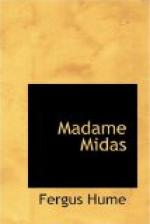‘It’s a special, ain’t it?’ he asked, suspiciously smelling it.
‘It’s the specialest I’ve got, any’ow,’ answered Spilsby, testily, putting the penny in his pocket; ’you’d eat a ’ole sheep if you could get it for a penny, you greedy young devil, you.’
Here Kitty, who was feeling faint and ill with so much walking, came forward and asked for a cup of coffee.
‘Certainly, dear,’ said Spilsby, with a leer, pouring out the coffee; ‘I’m allays good to a pretty gal.’
‘It’s more nor your coffee is,’ growled Grattles, who had finished his special and was now licking his fingers, ’it’s all grounds and ‘ot water.’
‘Go away, you wicious thing,’ retorted Spilsby, mildly, giving Kitty her coffee and change out of the money she handed him, ’or I’ll set the perlice on yer.’
‘Oh, my eye!’ shrieked Grattles, executing a grimace after the fashion of a favourite comedian; ’he ain’t a tart, oh, no—’es a pie, ’e are, a special, a muttony special; ’e don’t kill no kittings and call ’em sheep, oh, no; ’e don’t buy chicory and calls it coffee, blest if ’e does; ’e’s a corker, ’e are, and ’is name ain’t the same as ‘is father’s.’
‘What d’ye mean,’ asked Spilsby, fiercely—that is, as fiercely as his meek appearance would let him; ’what do you know of my parents, you bandy-legged little devil? who’s your—progenitor, I’d like to know?’
‘A dook, in course,’ said Grattles loftily; ’but we don’t, in consequence of ‘er Nibs bein’ mixed up with the old man’s mother, reweal the family skeletons to low piemen,’ then, with a fresh grimace, he darted along the street as quickly as his bandy legs could carry him.
Spilsby took no notice of this, but, seeing some people coming round the corner, commenced to sing out his praises of the specials.
’ ’Ere yer are—all ‘ot an’ steamin’,’ he cried, in a kind of loud bleat, which added still more to his sheep-like appearance: ’Spilsby’s Specials—oh, lovely—ain’t they nice; my eye, fine muttin pies; who ses Spilsby’s; ‘ave one, miss?’ to Kitty.
Thank you, no,’ replied Kitty, with a faint smile as she put down her empty cup; ‘I’m going now.’
Spilsby was struck by the educated manner in which she spoke and by the air of refinement about her.
‘Go home, my dear,’ he said, kindly, leaning forward; ’this ain’t no time for a young gal like you to be out.’
‘I’ve got no home,’ said Kitty, bitterly, ’but if you could direct me—’
‘Here, you,’ cried a shrill female voice, as a woman dressed in a flaunting blue gown rushed up to the stall, ’give us a pie quick; I’m starvin’; I’ve got no time to wait.’
‘No, nor manners either,’ said Spilsby, with a remonstrating bleat, pushing a pie towards her; ‘who are you, a-shovin’ your betters, Portwine Annie?’
‘My betters,’ scoffed the lady in blue, looking Kitty up and down with a disdainful smile on her painted face; ’where are they, I’d like to know?’




